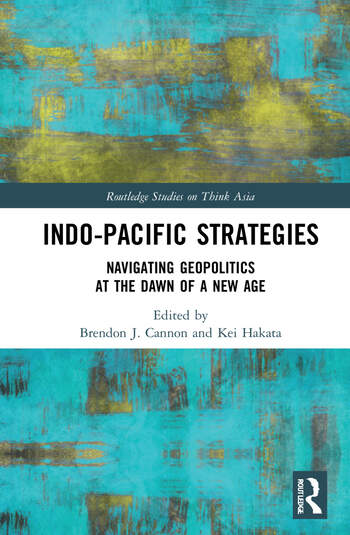
- 27 Apr 2022
The Middle East & The Indo-Pacific: The New Geopolitics
(This event is organised by MEI Diffusion of Ideas research cluster.)
The Indo-Pacific region has gained prominence as the world’s major powers gravitated towards this space to expand their influence but until recently, the Middle East seemed excluded from this geopolitical shift. Things have quickly changed: in the past years, Gulf states and Israel have become the object of increased attention from Asian powers and got themselves involved in new diplomatic arrangements such as the “Middle East Quad” that may impact the competition in the Indo-Pacific. In other words, Middle Eastern states traditionally looked at the West for strategic matters but they are now increasingly defining their security agenda with an eye towards Asia.
To understand the implications of this new nexus between the Middle East and the Indo-Pacific, this webinar will discuss with the authors of a new book dedicated to the Indo-Pacific strategies and they will help us unpack the geopolitics of the Indo-Pacific and discuss the place of Middle East powers in that environment.
This public talk will be conducted online via Zoom on Wednesday, 27 April 2022, from 5.00 pm to 6.30 pm (SGT). All are welcome to participate. This event is free, however, registration is compulsory. Successful registrants will receive a confirmation email with the Zoom details closer to the date of the event.
Image caption: Book cover of Indo-Pacific Strategies: Navigating Geopolitics at the Dawn of a New Age, edited by Brendon J. Cannon and Kei Hakata
Listen to the full event here:
Watch the full event here:
Dr Brendon Cannon’s slides can be accessed here
Prof Kei Hakata’s slides can be accessed here.
Dr Ash Rossiter’s slides can be accessed here.
Shinzo Abe’s foreword to Indo-Pacific Strategies can be accessed here.
Map of Indo-Pacific can be accessed here.
Read the Summary of Event Proceedings:
By Simran Kaur
Intern, Middle East Institute, National University of Singapore
The Indo-Pacific, in geographical terms, refers to states in the Asian Pacific and the Indian Ocean. However, in theoretical terms, the Indo-Pacific refers to much more. The foundation of the Indo-Pacific lies in the triangle of China, India and the United States, major powers who interact with the rest of the region. It also involves other countries such as Japan, South Korea and Indonesia, all of which are of particular strategic significance. The Indo-Pacific, as a concept, exemplifies the political narrative of power and competition: that there exists a zero-sum game wherein you are either with the United States or with China. This conundrum is all-too-familiar with Southeast Asia––especially Singapore, which has historically maintained friendly relations with major powers.
In recent times, regions less familiar with the game of balance have come face-to-face with it. The Middle East, for example, does not seem like a natural inclusion in the Indo-Pacific. However, with the recent tensions between Washington and Gulf states’ (including Israel) relations with China, the concept of the Indo-Pacific arrives in the Middle East. This webinar unpacks the geopolitics of the Indo-Pacific.
The Indo-Pacific is of great geopolitical strategical importance as it is where most of the global wealth is progressively being concentrated. The region contains both of the most populous states––China and India––, as well as other political and economic powerhouses like Singapore, South Korea, Japan and Australia. It stretches out to further include Eastern Africa and the Arabian Peninsula. Moreover, the Indian Ocean hosts major sea lines of communications. Thus, the Indo-Pacific enjoys global prominence that will sustain itself even in the face of foreseeable shifts in the industry. On this basis, Dr Brendon Cannon emphasises that the Indo-Pacific embodies the free and open virtues of the rules-based international system that has shaped, influenced and regulated relations between countries since the end of World War II.
Having said that, the concept of the Indo-Pacific is fairly hollow without implementing architecture to support it. The Quadrilateral Security Dialogue (colloquially known as the Quad) is a diplomatic network of four countries––Japan, India, Australia and the United States––that are committed to ensuring the Indo-Pacific remains inclusive and resilient.
Dr Cannon shares that the Indo Pacific will mean different things to different people. Even amongst the Quad, there is no unitary policy. However, unlike most scholars, Dr Cannon believes this is not a weakness. The Indo-Pacific, on a fundamental level, is a group of democratic states articulating diverse visions and hence, is intrinsically a concept that is open to interpretation. China’s Belt and Road initiative, in contrast, was produced and promoted by an authoritarian government that, for this reason, was capable of expressing a unitary vision.
Although the Indo-Pacific spans a large maritime area, there are areas eclipsed in discourse. Eurasia is geographically the maritime counterpart of the Indo-Pacific; however, its absence in Indo-Pacific strategies is particularly striking. In the first chapter, Professor Kei Hakata explores how Eurasia fits into the debate. In classical geopolitics, much of the attention was focused on the Eurasian heartland as a result of competition between Britain, Germany and Russia. In contemporary geopolitics, however, the peripheral maritime rim of Eurasia is now in the spotlight. Following the ongoing Russo-Ukrainian war, Professor Hakata describes that Russia has begun to be perceived as a “political loser”. To fill this vacuum, China has attempted to take greater control of Europe. As Russia is progressively cut off from Europe, it instead looks to India and the Asia Pacific for partnership. This chapter further examines the aforementioned parallel agenda.
In the second chapter, Dr Ash Rossiter explores the Indo-Pacific strategies of the United States, Japan and China. He admits that the latter differs from the first two in terms of transparency regarding official bureaucratic thinking and hence, it can be difficult to decipher what is truly happening in the minds of officialdom between the three case studies.
- The United States’ Indo-Pacific strategy largely revolves around freedom of movement in the seas as this provides access to the rest of the world. As a dominant maritime power, this is an unsurprising strategy. Throughout the US’ policy documents, Dr Rossiter shares that there is a broad consensus that the key to balancing China is maintaining a continental commitment to the region. The term Indo-Pacific, as opposed to Asia-Pacific, replaces the land mass that is China with the two oceans surrounding it. Thus, the US’ strategy is to almost “constrain” China by dominating said oceans.
- Japan is unthreatened by the United States. This is partially due to distance but also because the United States is solely a maritime power. China, in contrast, is both a continental and naval power. In retaliation, Japan aims to cooperate with like-minded democracies. Moreover, Dr Rossiter stresses that Japan is a trading nation. For this reason, it naturally aspires to maintain openness in the global maritime commons and is able to ally with the United States.
- Dr Rossiter admits that China is difficult to investigate. Nonetheless, the Belt and Road Initiative, as well as the Maritime Silk Road, are both expectable strategies from a hybrid power like China that is considering the significance of the Indo-Pacific.
In chapter five, Professor Hakata returns to explore Japan’s strategic thinking behind its Indo-Pacific discourse. The chapter explores [1] Japan’s political geography; [2] Japan’s Indo-Pacific foreign policy; [3] Japan’s diplomatic and security partnerships; and [4] Japan’s complicated enlargement. In this webinar, Dr Hakata elaborates on the first two topics.
Japan is surrounded by sea on all sides, conditioning Japan’s diplomacy, security and economy. For example, it has one of the largest exclusive economic zones in the world. As per the United Nations Convention on the Law of the Sea, Japan can exercise total jurisdiction over the area. The sea also serves as a natural fortress that protects Japan from invasion. However, this geography also burdens Japan with the need for considerable national defence and coast guard abilities, notably surrounding Nansei Island as it is challenged by Chinese assertiveness. Moreover, Japan is in a geopolitically challenging region, surrounded by states like Russia, China, North Korea and South Korea. For this reason, Professor Hakata shares that there is a growing sense of vulnerability in the region surrounding Japan’s security.
Professor Hakata then cites a speech by Shinzo Abe, Japan’s former prime minister, wherein he stresses Japan’s responsibility for “fostering the confluence of the Pacific and Indian Oceans and of Asia and Africa into a place that values freedom, the rule of law and the market economy, free from force or coercion and making it prosperous.” Professor Hakata perceives that this desire for freedom and openness is a direct denial of the coercion and predation once exercised by China. Regardless, the notion of a global commons is evident in Japanese policy.
Q&A Session
During the Trump presidency and the first year of the Biden administration, the Indo-Pacific appeared as the ultimate priority of the US. However, with the deployment of American forces in Europe due to the Ukraine War, do you think their priorities are impacted?
Professor Hakata shares that prioritisation may be affected by the Ukrainian war but he does not believe the impact is dire. As long as China is considered a systematic competitor by the United States, Washington will continue to divert much of its attention to the Indo-Pacific.
Dr Cannon adds that instead of the Ukrainian war limiting US involvement within the region, it may actually increase it in the interest of building allies.
With regard to the Indo-Pacific, Dr Rossiter suggests that Russia may play a balancing role against China’s hegemonic ambitions within Eurasia. The Ukrainian war caused a disconnect between Europe and Russia, forcing the latter to develop relations with China as a partner rather than a challenger. However, this is not a position that they are content with.
What are the consequences of the UAE’s decision to abstain during the initial vote on Russia’s invasion of Ukraine? Has it weakened the Middle East Quad (i.e. India, Israel, UAE, US)?
Dr Cannon explains that the UAE, Israel, and India share warmer ties between themselves than they do with Washington given the recent Abraham Accords. As the UAE is a non-permanent member of the Security Council, he disagrees that it will have a negative impact on the Quad. He also references that the day following the vote, the UAE voted to label the Houthis in Yemen as a terrorist group with Russia’s support. It is likely that this support would not have been garnered had the UAE voted with the US the previous day. As such, Dr Cannon reminds it is important to contextualise decisions.
Shinzo Abe called for Tokyo to consider hosting US nuclear weapons following the Ukraine war. On this basis, do you see a potential for a nuclear race in the Indo-Pacific?
Professor Hakata says the question of nuclear deterrence is closely tied to the increasing doubt on the reliability of the US-Japan alliance. It will be difficult to implement a nuclear sharing scheme between the two states as Japan has heavily championed the Treaty on the Non-Proliferation of Nuclear Weapons (NPT. With the current Prime Minister Fumio Kishida, who hails from Hiroshima, Japan is unlikely to expand its nuclear capabilities. With regard to a nuclear race in the Indo-Pacific, Professor Hakata believes the world has entered a period of history that has left old sentiments of nuclear warfare behind. He considers it extinct.
About the Speakers

Assistant Professor of International Security
Khalifa University
Professor Kei Hakata
Seikei University
Dr Ash Rossiter
Assistant Professor of International Security
Khalifa University
[Moderator] Dr Jean-Loup Samaan
Senior Research Fellow
Middle East Institute, NUS
Dr Brendon J. Cannon is Assistant Professor of International Security at Khalifa University, Abu Dhabi, UAE. He earned a PhD in political science from the University of Utah, USA, in 2009. His research is at the nexus of international relations, security studies and geopolitics. He has published on topics related to regional security and geopolitics, the arms industry and shifting distributions of power across the Indo-Pacific. Dr Cannon’s articles appear in Defence Studies, Small Wars and Insurgencies and Third World Quarterly. His latest book, edited with Kei Hakata, is Indo-Pacific Strategies: Navigating Geopolitics at the Dawn of a New Age (Routledge).

Professor Kei Hakata teaches at Seikei University, Japan. He specialises in international politics and security affairs in the Indo-Pacific. Previously, he worked for the Japanese Ministry of Foreign Affairs where he dealt with Africa and official development assistance.

Dr Ash Rossiter has been Assistant Professor of international security at Khalifa University since 2015. He received his PhD from the University of Exeter in 2014, after completing a Masters in War Studies from King’s College London. He is the author of Security in the Gulf published in 2020 by Cambridge University Press.
Dr Rossiter has also published widely on technology and international security, strategy, warfare, comparative defense industries and the changing military balance in the Indo-Pacific. His work has appeared in peer-reviewed journals such as Intelligence & National Security, Defence Studies, Parameters, Diplomacy & Statecraft, Small Wars & Insurgencies, Middle Eastern Studies as well as many other outlets.
He has written numerous policy reports and evaluations for several governments. Before entering academia, he pursued a career across the Middle East spanning both governmental and private sectors.

[Moderator] Dr Jean-Loup Samaan is a Senior Research Fellow specialising in Middle East strategic affairs, with a particular focus on the Israel–Hizballah conflict and the evolution of the Gulf security system. Prior to joining MEI, he held various positions in the policy sector. He worked as a visiting scholar with the RAND Corporation (2007-2008) and as an advisor at the directorate for strategic affairs of the French Ministry of Defence (2008-2011). He then gained extensive experience in the domain of military education and training, first as a deputy director for the Middle East Faculty of the NATO Defence College (2011-2016) and as an associate professor in strategic studies with the UAE National Defence College (2016-2021).



